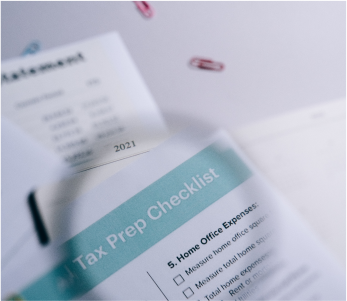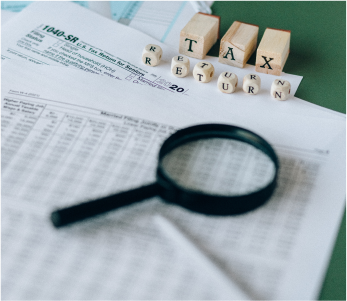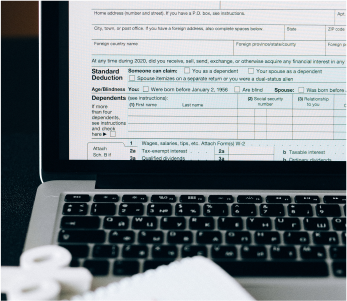⭐⭐⭐⭐⭐ Rated 5 stars By Our Happy Customers
Everything You Need to Know About Filing Your Income Tax Return
- Best Tax Compliance Services Nationwide
- Expert Guidance for Your Income Tax Returns
- Simplify Tax Compliance with Our Online Platform
Let's Get Started
Overview
It's time for many of us to start filing our income tax returns. With the deadline quickly approaching, it's important to understand the basics of filing an income tax return. Income tax return filing is a process where you report your income and expenses to the Internal Revenue Service (IRS). The information reported helps the IRS determine how much taxes are owed or if a refund is due. Knowing what documents are necessary for filing your return and what deductions can be taken can help make this process easier.
Filing an income tax return has numerous advantages. For starters, it allows taxpayers to receive any refund they may be due, as well as deductions for eligible expenses. Moreover, an income tax return can help taxpayers keep track of their financial situation and plan for the future. Furthermore, filing an income tax return can help protect taxpayers from numerous legal issues, including audits and criminal penalties. Finally, filing an income tax return is a great way to demonstrate financial responsibility.

Filing compliance for your business is easy and can be done by online with Lexproadvice

Fill the form

Talk to Accountant

Get Your ITR-V
Benefits

Easy Loan Approval: Filing your income tax returns on time can help you improve your financial history, which in turn can boost your credit scores. This is important when you apply for loans, credit cards, and other financial products from banks. By filing your income tax on time, you show lenders that you are a responsible borrower who pays their taxes promptly. This can help you build trust with lenders and increase your chances of getting approved for loans or other financial products.
Claim Tax Refund: Filing your income tax returns on time can help you claim refunds, like when you open a new savings or PPF account or when you pay more tax than you needed to. But to be eligible for these refunds, you must file your tax returns on time. Missing the deadline could cause you to miss out on your refund.
If you invest in fixed deposits, about 10% of tax is deducted at the source (TDS). However, if you file an ITR, you can save money on taxes for income from savings vehicles like term deposits. You can also save money on your dividend income by submitting an ITR. Although these instruments are taxed, ITR refunds can be used to offset the tax liability.


Income & Address Proof: The Income Tax Return is valid as address verification. Even an Aadhaar Card can be obtained using it. Aadhar Cards, licenses, passports, and other documents like those are all required to have address proofs. Subsequently, these documents do not accept common forms of identification like ID cards. Your Income Tax Return can be applied in such cases.
Quick Visa Processing: When applying for a visa, most countries require you to submit your income tax return as one of the documents. This provides the visa processing officials with information about your current financial situation and income. The embassy will review your income and confirm that you are financially capable of covering the expenses during your visit. Several foreign consulates request the last three years’ income tax returns or the current year’s income tax return. Failure to provide any return may reduce your chances of obtaining a visa, especially if you are applying for a visitor, investor, or work permit. This is mandatory if you plan to travel to countries like the United States, the United Kingdom, Canada, Europe, and South East Asia.


Carry Forward Your Losses: To claim losses resulting from capital gains, Business or income from house property, taxpayers must file their tax returns on the due date. For example, if you have made a profit on the sale of mutual funds or stocks, you can offset it with losses from previous years by filing your tax returns on time. However, if tax returns are not filed on time, unadjusted losses (with some exceptions) cannot be carried forward to subsequent years. Therefore, filing a tax return is necessary to ensure that the losses are carried forward and adjusted in the future.
Avoid Penalty: It’s important to file your income tax return on time to avoid paying fines and interest. In India, if you don’t file your tax return by the deadline, you’ll have to pay a penalty of Rs 5,000. If you continue to delay, the fine could go up to Rs 10,000. If you owe any taxes and don’t pay them by the deadline, you’ll also have to pay interest on the amount you still owe. But if you file your tax return on time, you can avoid these fines and interest fees


For Buying Term Insurance: Nowadays, it has become common to buy life insurance policies worth Rs 50 lakh or Rs 1 crore. If you purchase a term policy with a total insured amount of Rs 50 lakh or more, life insurance companies, especially LIC, may ask for your income tax return receipts. This is because the insured amount of a term policy is based on various factors, including the income of the policyholder.
Our Services
We consistently strive to deliver the utmost service to our valued customers
ITR for Individual
ITR for Partnership/ LLP
ITR for Company
ITR for Proprietorship
ITR for Trust/ NGO
ITR for HUF
Documents Required
To fulfil IT filing in India, the following documents are necessary:

Bank Statements for the financial year

Books of Accounts like Profit and Loss account & Balance Sheet & Computation

Aadhar Card

Pan Card

Email & Aadhar linked mobile number

Bank account details

Statement of receipts and payments when no regular books are maintained

Tax Audit report (if applicable)

Statutory Compliance details (if applicable)

GST Compliance details (if registered)

Payroll Compliance details (if applicable & registered)

Source of Income Details for the financial year & Any other documents if required.

Documents on purchase and sale of investments/assets
Why choose Lexproadvice

1000
+ Startups

500+
5 star review Rating

Affordable
Pricing

1000
+ Startups

500+
5 star review Rating

Affordable
Pricing

Faster
Processing

Track Progress
& Customer Support

Dedicated
Expert

Faster
Processing

Track Progress
& Customer Support

Dedicated
Expert
Frequently Asked Questions
If there exists a relation of payer and payee in a firm or agreement, and the relation is defied on of employer and employee where the employee is being paid a certain amount of remuneration for his or her services, then the income can be charged under this head in the Income Tax Act. A salary could be any sort of monetary compensation. This could be any basic and normal wage, annuity, pension, gratuity, leave encashment, etc.
After making a total aggregate of the total amount of income excluding the exemptions if, at all present, the total amount or gross salary is then charged under this income head of the Act.
All basic salaries along with commissions and bonuses are completely liable to taxation.
Under the income head for salary, the salaries include allowances and there are some allowances that are exempt from tax under some conditions. Allowances are; as per the Act, a fixed amount of money paid to an employee in regard to the labour and service are done by him. The allowance is generally included with the salary unless specific exemptions are mentioned. Some exemptions for allowances are conveyance allowance: allowance given for the purpose of the allowance is exempt from tax up to a limit of rupees 800 per month. These are some of the many types of allowances and their clauses for tax deductions under section 80C-80U under Chapter VI of the Income Tax Act. Other monetary payments made to employees by an employer also have their own methods of taxation.
Another head in the Income Tax Act, this clause shed light and detail about the taxation policy on the house or real estate that you as a tax payer are residing in. Vacant house property is considered as ‘self-occupied’ in regards to the purpose of income tax. In the situation that a taxpayer owns more than a single self-occupied house, then only one house is treated and considered as a single self-occupancy house property. Rest is considered to be let out.
This is the second head of the Income Tax Act is dedicated from section 22 to 27 which correspond to the computation and calculation of total standards amount of income by a person in the house or property which he or she rightfully owns. The tax amount charged is not acquired from the amount of rent that is received but rather on the property or land as a whole. Nonetheless, is the; and or property is being used for a normal course of business, then the income generated from the rent will also be included to be charged for tax income.
Any and all commercially owned resident or property owned is also subjected to taxes.
For income from house property to be taxable, a few conditions must be satisfied and fulfilled.
The house property has to consist of a house, building or any land appurtenant.
The taxpayer should be the owner of the house property.
The house property must not be used for any business or professional venture done and carried out by the taxpayer. It can only be used for residential purposes.
Having these conditions met, the income generated by house property thereby becomes chargeable and liable to tax deduction as per the Income Tax Act.
This is the third head under the Income Tax Act. A business includes any kind of trade, commerce manufacturing or any nature of trade. Profession implies the acquisition of specific or special knowledge in a particular field after a period of education and verified examination. Under this head of income, profits and gains made during the tenure of business are subjected to complete and total taxation. Section 28 of the same Act also states that any form of compensation or other sorts of payments which are due to particular individuals is also not beyond tax. Income formed by the practice of trade o commerce in the specific field of the professional is also liable to tax. Profits incurred on the sale of imports, incentives, any interest or form of salary or bonus, a commission from a firm, all are taxable under the head of income in the Income Tax Act. Even any amount that is received by a key man policy company is not exempt from taxation. For an income to be charged under the head of income from profits and gains from business or profession, there are some rules and conditions that must be fulfilled according to the Section 28 of the Income Tax Act.
For income to be charged, business or profession must exist in the first place.
The business or profession must be carried out by the taxpayer or assesse him/herself.
The profession or business whose income is to be charged must be operational and be carried on for a greater part of the previous year.
The tax charge is based on the profits and gain made by the business during its running and operating time of the previous year.
The charged made can be extended to any and all business or profession that is ongoing or being carried on by the assesse.
Only and only if these conditions are applicable, then the income from profits and gains generated can be charged for tax under the Income Tax Act. It is important to note that to be charged under this head, the business or profession need not be operational throughout the entire previous year. As long as it has been carried on by the assesse for some time during the previous year, it is chargeable.
Being the fourth head of income under the Income Tax Act, income gained from any capital asset, be it movable or immovable, is deemed as taxable. Capital gains are divided into two parts: long-term capital gains and short-term capital gains.
For short-term capital gain, if any capital holder sells his capital within a period of thirty-six months, the deduction of tax can be taken. The same can be said for securities sold within twelve months of its purchase. Under the Section 11A on the Income Tax Act, equity and equity shares funds that have been sold in stock exchange and securities transaction tax on such short-term capital gains is chargeable to tax at a rate of 10 percent up to 2008-9 and 15 percent from 2009-10 onwards.
On the other hand, long-term capital gains are taxed at a rate of 20 percent. Under sections 80C to 80U, no long-term tax deductions are allowed. However, in the case of single and HUF where the amount of income is lower than the minimum income requited to be exempted from tax, the basic exemption limit is adjusted against the long-term capital gains.
Long-term capital gains are those which are held up for more than a period of thirty-six months and for the case of securities and shares it is a span of twelve months since the date of purchase. The long-term capital gain can be found by taking out the net sale consideration of the long-term capital asset along with the index cost of acquiring those assets and the cost of the improvement. The remainder that is left is then charged with tax by the Income Tax Act
SGST : As per the SGST Act, the State GST or SGST applies to intra-state supplies of goods and services. It is administered by the respective state government. SGST liability can be set off against SGST or IGST input tax credit only.
CGST : Central GST or CGST would be levied under the CGST Act on the intra-state supplies of goods and services. Hence in the case of intra-state supplies of goods and services, both the central and state government would combine their levies with an appropriate revenue sharing agreement between them.
IGST : Integrated GST or IGST is the tax levied under the IGST Act on the supply of any goods and services in the course of inter-state trade across India. Further, IGST would include any supply of goods and services in the course of import into India and the export of goods and services from India.
The fifth and last head of income under the Income Tax Act is the income from other sources. Any income derived from sources other than the previously mentioned four heads is considered to be under this category of income. Some example of other sources of income could be, interest gained from bank deposits, winning in the lottery or even any sum of money which is more than rupees 50,000 received from another individual who does not form a part of the taxpayers relative, spouse or if the money is acquired via inheritance or will. All these sources, even if it is gambling or even card games are chargeable for tax under Section 56(2) of the Act.
Section 145 of the Income Tax Act states the details for the computation and income tax calculator generated from other sources. As per the Section, in come from other sources shall be computed and calculated by the regular accounting method which is followed by whoever the assesses is. This can be either in cash or in a mercantile accounting system.
Yes, GST Registration is mandatory for export of services in India.Export of services or products is classed as a “zero-rated supply” under Section 16 of the IGST Act. As a result, it is not an exempt category. Zero-Rated Supply is also applicable to supply of export services to Special Economic Zones.
